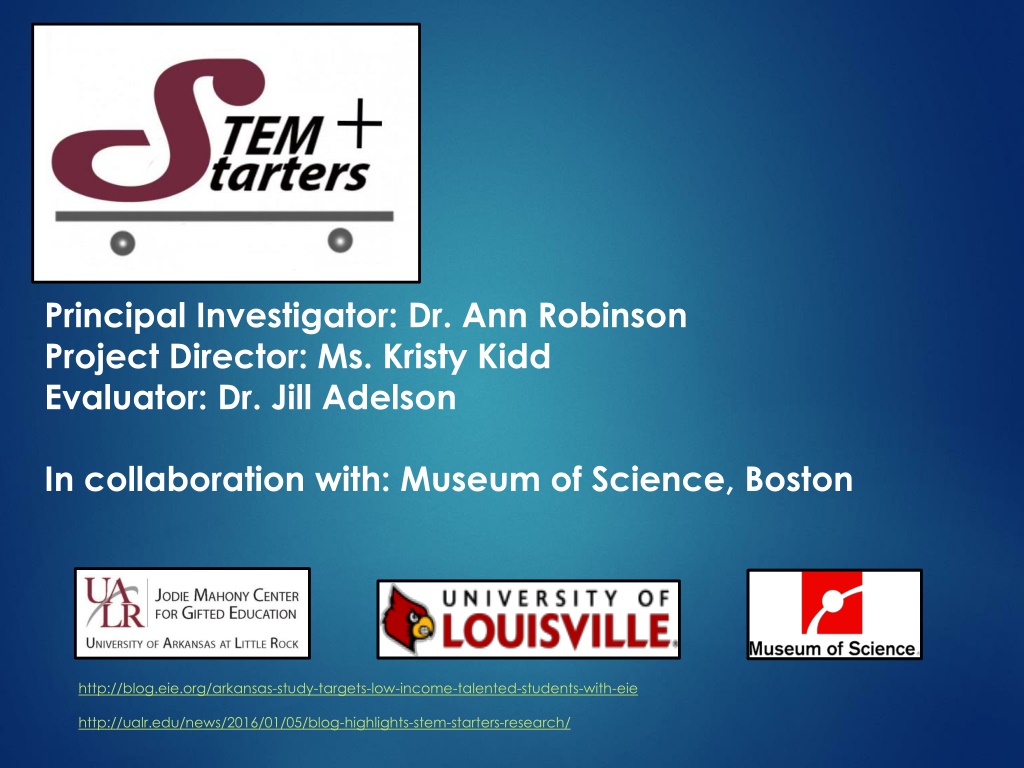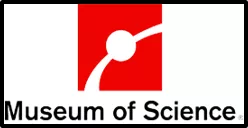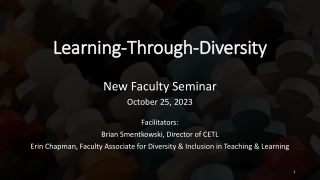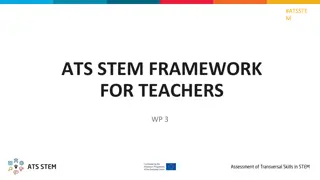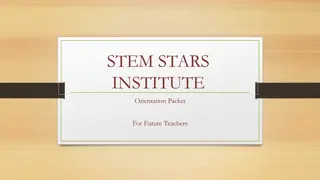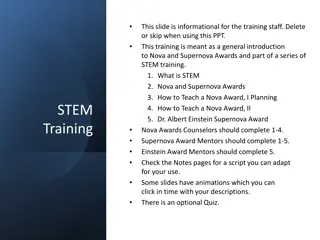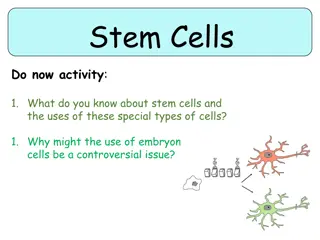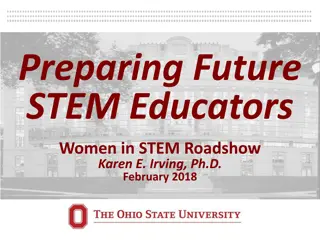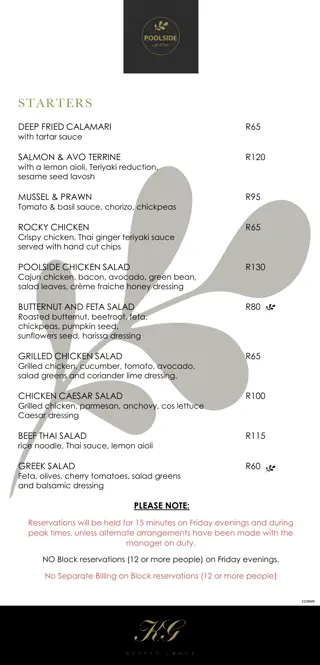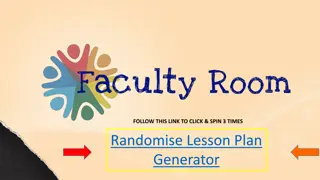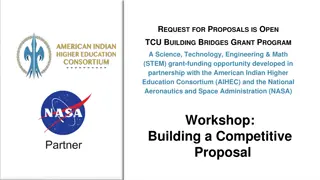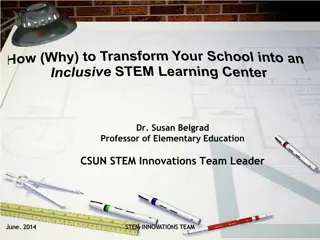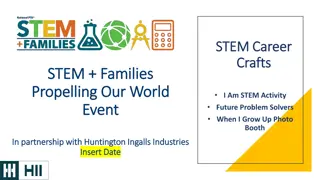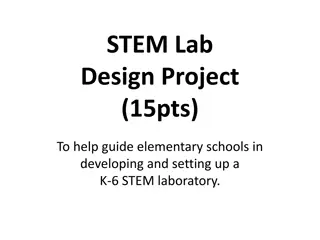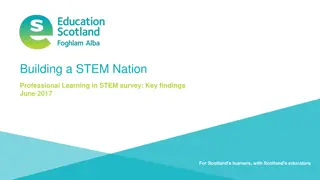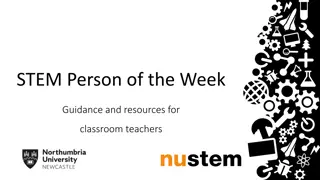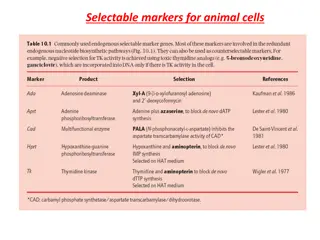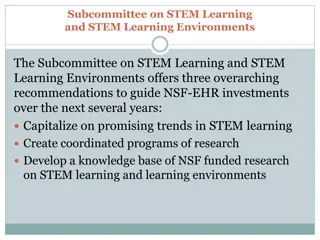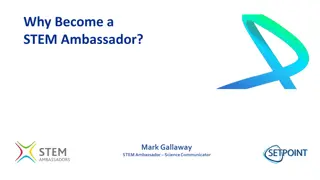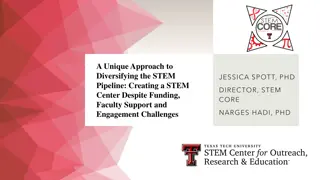STEM Starters+ Project Evaluation and Results
STEM Starters+ project focuses on serving Grade 1 students and talented students in Grades 2 through 5 through engineering and science units. The project includes professional development for teachers and aims to spot talent in low-income and culturally diverse students. The formative evaluation conducted in Year 1 highlighted positive aspects like strong communication and engagement by teachers and students, alongside challenges such as time constraints. Significant differences were noted in various self-efficacy scales between experimental and comparison groups.
Download Presentation

Please find below an Image/Link to download the presentation.
The content on the website is provided AS IS for your information and personal use only. It may not be sold, licensed, or shared on other websites without obtaining consent from the author. Download presentation by click this link. If you encounter any issues during the download, it is possible that the publisher has removed the file from their server.
E N D
Presentation Transcript
Principal Investigator: Dr. Ann Robinson Project Director: Ms. Kristy Kidd Evaluator: Dr. Jill Adelson In collaboration with: Museum of Science, Boston http://blog.eie.org/arkansas-study-targets-low-income-talented-students-with-eie http://ualr.edu/news/2016/01/05/blog-highlights-stem-starters-research/
PROJECT DESCRIPTION STEM Starters+ is designed to serve all students in Grade 1, identified talented students in Grades 2 through 5, and their teachers. Teachers are served through professional development on implementing engineering and science curricula and on talent spotting low-income and/or culturally diverse students. Grade 1 students are served through an engineering unit and a STEM biography linked to the unit content. Grades 2-5 students are served through engineering and science units and multiple STEM biographies linked to the unit content.
Teacher Baseline RESULTS PASTeL: Perceptual Assessment of Science Teaching and Learning (possible range 0 100) Scale Group N Mean (SD) Range Experimental 61 72.22 (10.93) 50 94 Teaching Scale Comparison 40 69.87 (9.50) 44 - 95 Experimental 59 63.59 (9.67) 33 - 84 Student Learning Scale Comparison 39 61.71 (8.73) 39 - 79 * There was not a statistically significant difference between the groups on either of these scales. TESS: Teaching Engineering Self-Efficacy Scale (possible range 1 6) Scale Group N Mean (SD) Range Experimental 61 3.64 (1.14) 1.11 5.67 Engineering Pedagogical Content Knowledge Self-Efficacy (KS) Comparison 39 2.63 (1.19) 1.00 5.33 Experimental 61 4.86 (1.00) 2.00 6.00 Engineering Engagement Self- Efficacy (ES) Comparison 39 4.21 (1.62) 1.00 6.00 Experimental 61 4.89 (1.10) 1.00 6.00 Engineering Disciplinary Self-Efficacy (DS) Comparison 39 4.63 (1.32) 1.00 6.00 Experimental 61 4.52 (0.93) 1.80 6.00 Engineering Outcome Expectancy (OE) Comparison 39 3.95 (1.24) 1.00 6.00 Experimental 61 4.48 (0.84) 2.31 5.78 Teaching Engineering Self-Efficacy (TESS) Comparison 39 3.86 (1.01) 1.00 5.73 * There was a statistically significant difference between the groups on all of these scales except for DS.
Educator RESULTS STEM Starters+ Year 1 Formative Evaluation Interviews with Teachers, Principals, and Central Office Administrators Conducted October, 2015 Overarching Themes Positives - Very strong communication from Ms. Kidd - Excellent training - Engagement and excitement by teachers and students - Hands-on learning and higher achievement - Teachers recognized that their instructional behaviors as changed based on what they did at the summer institute Concerns - Time (for professional development, to teach, to organize materials, for assessments) Suggestions - Email is the best form of communication, although a few indicated a hard copy news bulletin would be nice. Principals would appreciate a news bulletin (electronic or hard copy). - Ms. Kidd visiting schools in person once a month to answer questions - Consider a longer summer professional development - Consider doing the same unit for 2nd and 3rd grade and for 4th and 5th grade
Challenges Lessons Learned Teacher administered assessments are not collected systematically or thoroughly Modified research design to focus on open- ended science process instrument during years 3 and 4 of the project Amount of data overwhelms other aspects of the project Lack of engineering instrumentation with adequate psychometric properties for elementary students and teachers Collaborated to review, adapt, and develop instrumentation School instability due to changes in district management Added extra district to account for possible attrition due to school instability Lack of communication across various district levels (classroom, office, school, and central office) Communicated project opportunities and successes early and often at district, building, and classroom levels. Drilled down to daily schedule to suggest instructional slots negotiated with district literacy directors Perceived lack of instructional time to teach the engineering units in Grade 1 Scheduling professional development institutes during a time teachers are available and agreeable Offered professional development multiple times during summer 2015 with make-up sessions available during the fall 2015
